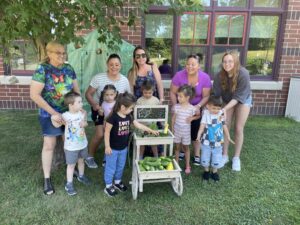 In an effort to understand the broad impacts of the Northeast Food for Schools (NFS) program* throughout the Commonwealth, we at Massachusetts Farm to School are sitting down with local food hubs, farms, and participating school food programs. This story is drawn from an interview with Kelsey Sanders, Food Service Director at Webster Public Schools, who shared her experience forging relationships with producers in her area and getting Webster Public School students excited about fresh, local produce.
In an effort to understand the broad impacts of the Northeast Food for Schools (NFS) program* throughout the Commonwealth, we at Massachusetts Farm to School are sitting down with local food hubs, farms, and participating school food programs. This story is drawn from an interview with Kelsey Sanders, Food Service Director at Webster Public Schools, who shared her experience forging relationships with producers in her area and getting Webster Public School students excited about fresh, local produce.

Webster Public Schools, led by Food Service Director Kelsey Sanders, has utilized Northeast Food for Schools funding to successfully embrace local food sourcing through partnerships with farms and food hubs, greatly enhancing the district’s meal program. Kelsey prioritized community engagement and educational opportunities when seeking new farm partners, expanding beyond pre-existing relationships to connect with Whittier Farms and other local suppliers. By participating in the NFS program, Kelsey has greatly increased Webster’s local purchasing efforts, introducing students to fresh, locally grown produce and meat. This initiative not only enriched the school menu but also deepened students’ awareness of local agriculture and nutrition.
Webster’s approach to NFS was also aided by the district’s receipt of a MA FRESH grant, which helped support educational and promotional activities such as taste testing as well as significant expansion of the school garden program. Produce from the school’s gardens supplemented local products purchased by the food service department from area farms.
As soon as Webster received the news of their Northeast Food for Schools funding, Kelsey began the search for local farms from which to procure local ingredients. The district was initially awarded $16,830 for the 2023-24 school year and received just over $8,000 in additional reallocation funds for the 2024-2025 school year. Though Webster had a pre-existing relationship with Worcester Food Hub prior to their participation in the Northeast Food for Schools program, they were also proactive in reaching out to establish new relationships with farms in their area.
They had success connecting with Whittier Farms in Sutton, MA. They had previously placed an order from them when a squash purchase fell through, and found them to be very responsive and interested in working with the district. Kelsey shared that while local purchasing can be daunting at first, “Don’t be afraid to try it! There is a lot of help available from Massachusetts Farm to School (individual assistance & webinar archive), MA Dept. of Elementary and Secondary Education, and by connecting other food service directors doing this work.” Kelsey’s confidence in local purchasing has grown to the point that she has started to write and release her own Requests for Proposals (RFPs) which are a formal solicitation process the state requires for large purchase thresholds.
 Participation in NFS was an opportunity for her to develop greater camaraderie with other school nutrition professionals, learning about where to source local produce as well as receiving new recipes to try in her cafeterias. For those just getting started, she suggests, “Do taste tests with students and make a ‘local showcase day,’ tied to the Harvest of the Month (HOTM) program calendar.”
Participation in NFS was an opportunity for her to develop greater camaraderie with other school nutrition professionals, learning about where to source local produce as well as receiving new recipes to try in her cafeterias. For those just getting started, she suggests, “Do taste tests with students and make a ‘local showcase day,’ tied to the Harvest of the Month (HOTM) program calendar.”
Kelsey set up a local taste test during March’s Dairy Harvest of the Month by procuring Cabot Seriously Sharp Cheddar and Pepper Jack cheese sticks. Students were excited to see a product featured in the cafeteria that their parents also purchase for them to enjoy at home. Kelsey was able to share that the cheese sticks are produced nearby in Vermont, “The milk is from cows in Vermont, just one state over from our students. It opened up the window for them about local foods, and they were so thrilled to learn more.” Webster has worked to connect with students in the cafeteria in order to adapt the menu and offerings based on student feedback. She served local cooked carrot coins from Joe Czajkowski’s farm in Hadley, and students shared they enjoy raw carrots, and now she serves the carrot coins raw.
Using NFS funds, Webster was able to source a variety of local meat and produce items including beef, squash, apples, lettuce (supplemented with lettuce & spinach from their own school gardens), and tomatoes. These locally sourced products were incorporated into menu items such as hamburgers and a beef & broccoli dish made with local beef from Whittier Farms.
“When we used beef from Whittier for hamburgers, it was very popular with students and our participation was very high. Students said they could smell them cooking through the whole school,” Kelsey said, indicating that the students could definitely taste (and smell) the difference in the quality of the locally sourced meat.
Carlson’s Orchard’s apple cider was also a bit hit, along with raw vegetable sides, and fresh potato wedge “fries,” and potatoes for a make-your-own potato bar day. NFS funding allowed enough wiggle room in the budget to use regular meal program funds to purchase new items not eligible in NFS like Red’s Best Fish Sticks which students enjoyed a great deal.
Prior to having access to NFS funds, Webster was only able to place orders with Worcester Food Hub inconsistently throughout the month, but now they are able to place weekly orders. Kelsey was able to, “more than double our purchasing with the Worcester Food Hub.” Going forward, she would also like to establish a regular ordering schedule with Whittier Farms. She’s also looking to find a local poultry farm to source local chicken for the cafeteria. She’s hoping to use her connection with Whittier Farms as a jumping off point for conversations with other farms. She believes the ability to demonstrate her positive working relationship with Whittier will entice other farms to want to work with her. If she no longer had access to NFS funding, Kelsey cited the MassGrown Exchange as a resource to aid in her continued efforts to source locally.
Overall, Webster Public Schools had a successful and rewarding experience and was pleasantly surprised to have minimal challenges spending the NFS funds. The highlights for Kelsey included being able to support the Farm to School mission, and giving students access to fresher, better tasting local food. The district is located in a high-needs, small town community, so beyond being able to offer a delicious and nutritious meal, having the opportunity to share nutrition education within the cafeteria through Harvest of the Month is a huge added benefit to the students she serves. Webster’s participation in the Northeast Food for Schools program proved to them that purchasing locally is not only possible, but possible without huge extra costs or hassles. Overall, the Webster Public Schools experience with the NFS program was a great success!
*Northeast Food for Schools is a one time USDA program providing funds for schools to spend on locally sourced foods. The program is designed to support schools in new or expanded local food purchasing with a focus on purchases from underserved farmers and small-scale producers.
Phone: (413) 253-3844
Email: info@massfarmtoschool.org